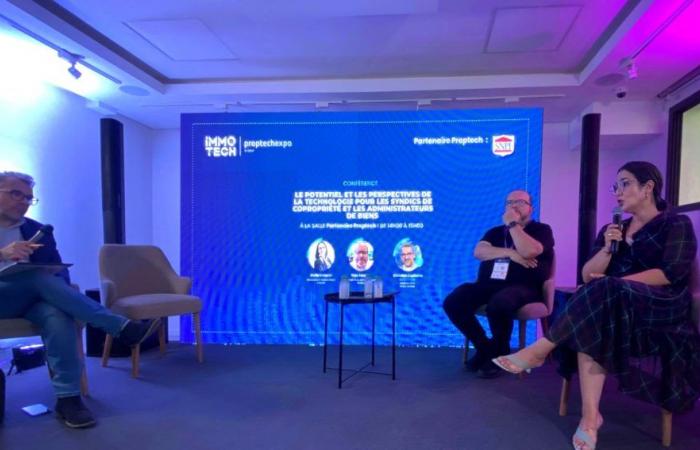This event, dedicated to technological innovation in real estate, brings together key players in the sector to explore new trends and opportunities.
In this context, Dalila ENNACIRI, Founding President of AMCOP, spoke at a conference entitled: “The potential and prospects of technology for co-ownership trustees and property managers”. The conference highlighted the specific challenges facing the co-ownership sector in Morocco and proposed avenues for a digital transition adapted to its realities.
Digitalization: potential to be exploited for co-ownership
While many economic sectors are embracing digital technologies to improve their processes, co-ownership remains largely on the fringes of this dynamic. Morocco, in particular, is faced with a gap between the technological offer and the daily practices of trustees and property administrators.
The conference highlighted how the adoption of digital tools could transform the management of co-ownerships, by facilitating interactions between the different actors (trustees, co-owners, service providers) and improving the transparency of operations. Online platforms could, for example, centralize information, automate administrative processes and provide real-time access to critical data. However, despite this potential, digitalization initiatives are still timid.
Legislative and regulatory barriers that hinder innovation
One of the major obstacles to this transformation is legislative. Current legal frameworks governing co-ownership do not fully integrate new digital realities. The laws in force, although essential to regulate co-ownership, are often perceived as rigid and do not take into account the advantages offered by modern technological tools.
Dalila ENNACIRI underlined during her intervention the need for a legislative overhaul which would encourage digitalization. More flexible legislation would make it possible to adopt innovative practices, such as the management of general meetings remotely or the electronic signing of official documents. These legal adjustments are essential to stimulate innovation in real estate management.
Inspiring examples on an international scale
During the conference, AMCOP relied on examples of countries that have successfully integrated technology into co-ownership management. In Europe, for example, many property management companies are already using dematerialized platforms to improve communication with co-owners and simplify internal processes. Such practices make it possible to gain efficiency and transparency, while reducing administrative costs.
The objective for Morocco is to draw inspiration from these models and adapt best practices to the local context. AMCOP aims to play a central role in this transition by encouraging different stakeholders to think about solutions that could meet the specific needs of the country.
Towards a digital future for Moroccan co-ownership
The AMCOP conference aims to initiate a constructive dialogue between condominium associations, property managers, legislators and technology solution providers. The digitalization of co-ownership is no longer a question of “if”, but of “when” and “how”. With appropriate legislation and a collective desire for modernization, Moroccan co-ownership can benefit from the many advantages that technology offers, such as reduced processing times, better transparency and more fluid communication.






